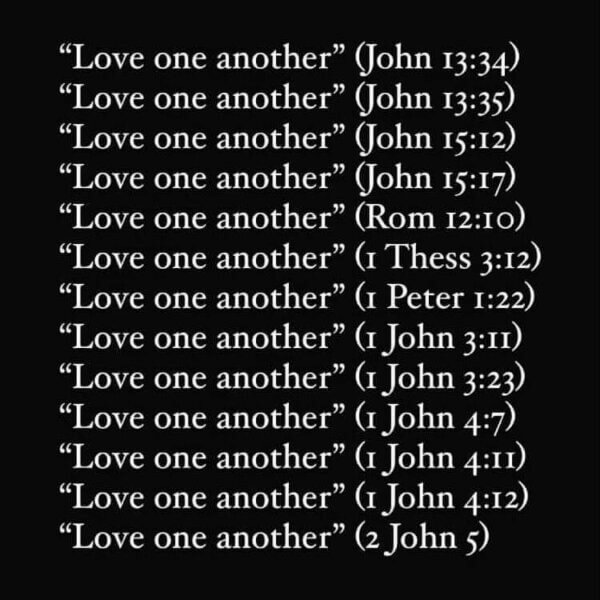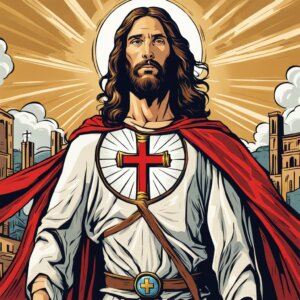
Just Love One Another
 Our lectionary theme for today, the sixth Sunday of Easter, is love. You heard it in the Collect and weaving its way through the readings, most vividly in John’s gospel, and in the epistle, the first letter of John. There was a meme going around on Facebook this week, first posted by Diocese of Texas Bishop Andy Doyle, and then quickly reposted by pretty much every priest in Christendom, best I can tell. The meme is just white letters on a black background repeating the words Love one another 13 times, with the scriptural source of the quotation:
Our lectionary theme for today, the sixth Sunday of Easter, is love. You heard it in the Collect and weaving its way through the readings, most vividly in John’s gospel, and in the epistle, the first letter of John. There was a meme going around on Facebook this week, first posted by Diocese of Texas Bishop Andy Doyle, and then quickly reposted by pretty much every priest in Christendom, best I can tell. The meme is just white letters on a black background repeating the words Love one another 13 times, with the scriptural source of the quotation:
Love one another. It’s a simple message, and super clear, repeated so many times that we just have to stop and listen. Love one another. Just do it! Easy peasy, right?
But is it? What does loving one another look like out in nature, as we walk and live it every day? John’s gospel reading this morning gives us an example, as John’s Jesus says, No one has greater love than this, to lay down one’s life for one’s friends. Now, wait a minute — that seems like a really high bar, because we know that Jesus actually did lay down his life for his friends, even to his death on the cross. So what does that mean for us as we try to carry out this commandment to love one another?
What is Jesus Asking of Us?
 Is Jesus asking each of us, all of us, to be superheroes, rushing into dangerous situations to protect our friends from physical, emotional, political, legal, or economic harm? I don’t think so. As my friend the former All Saints’ Atlanta rector Geoffrey Hoare often said to the All Saints’ vestry — usually to talk us down from one of our latest ideas to save the world (or the at least the Midtown Atlanta block where All Saints’ was situated), the job of savior has already been filled; Jesus saw to that.
Is Jesus asking each of us, all of us, to be superheroes, rushing into dangerous situations to protect our friends from physical, emotional, political, legal, or economic harm? I don’t think so. As my friend the former All Saints’ Atlanta rector Geoffrey Hoare often said to the All Saints’ vestry — usually to talk us down from one of our latest ideas to save the world (or the at least the Midtown Atlanta block where All Saints’ was situated), the job of savior has already been filled; Jesus saw to that.
So what does it mean, then, to lay down one’s life for one’s friends? I wonder if it means something much different from actually dying for each other, maybe something both less extreme and much, much more difficult for us to do. I think that this commandment is not about death but life — abundant life. What if laying down one’s life for one’s friends — the very greatest love in Jesus’ thirteen times’ repeated command to love one another — means to lay aside our own selves and preferences and our own way of doing things for a minute to really listen to each other?
What if it means responding to another’s vulnerability or trouble not with what we want to say, but with what they need to hear to live their best life, as the Gen Z among us might say? What if laying down one’s life for one’s friends means to compromise, to imagine, to loosen our grip on the way it’s always been done in our own experience and really hear about another’s context in love and curiosity? What if the greatest love — laying down one’s life for one’s friends means an astonishing, radical inclusion — bigger and more wonderful than we have ever imagined?
You know that during Eastertide, we read from the Acts of the Apostles, the book of all that happened among Jesus’ followers in the first days, weeks, and years after the resurrection. This was a time when the disciples and all who walked with Jesus were still struggling to get their minds around this resurrection thing — what had just happened — and what it meant for everyday life. They were not meeting to figure out whether to use purple or blue vestments during Advent, or whether the 8:00 service on Sundays should be Rite I or Rite II. They were wondering how to live together — how to take care of one another, how to work, raise their families, and listen and share across a variety of divergent experiences and backgrounds as people came together into the community. Remember Peter from the Acts reading this morning. While he was still speaking, the Holy Spirit fell upon all who heard the word. The Jewish believers who had come with Peter were astounded that the gift of the Holy Spirit had also been poured on the Gentiles — those who were not Jewish like Peter and like Jesus.
So how does Peter — a simple Jewish fisherman from way up in the Galilee, far from the political, religious, and intellectual diversity of Jerusalem — respond? He responds in the way he learned from walking with Jesus. He watches. He listens. He’s present to listen to others, he’s curious about their contexts, and he reimagines a world that includes their experiences and participation. That is, I think, how Peter lays down his life for his friends in that moment. He loosens his grip on his own experience and background and says, Can anyone withhold the water for baptizing these people who have received the Holy Spirit just as we have? and tells the followers to go ahead and baptize the Gentiles in the name of Jesus.
Lessons Learned
 I’ve learned some important lessons in presence, curiosity, and reimagination at Emmanuel this week. For example, I’ve struggled through shock at the magnitude of the excavation in the church yard to accommodate our new storm drainage system — reconciling us with our environment in the new world of climate change, where storms that send 4,000 gallons per inch of rain into the church yard and basement are both more frequent and serious. It’s a very big hole, but being present and listening to the contractors helped me to be less fearful and anxious about the cost and the mess. Being curious and asking them questions led me to realize that this project will not only be the foundation of Emmanuel’s environmental resilience, but also may actually facilitate the construction of the Community Bridge, our much-needed access ramp.
I’ve learned some important lessons in presence, curiosity, and reimagination at Emmanuel this week. For example, I’ve struggled through shock at the magnitude of the excavation in the church yard to accommodate our new storm drainage system — reconciling us with our environment in the new world of climate change, where storms that send 4,000 gallons per inch of rain into the church yard and basement are both more frequent and serious. It’s a very big hole, but being present and listening to the contractors helped me to be less fearful and anxious about the cost and the mess. Being curious and asking them questions led me to realize that this project will not only be the foundation of Emmanuel’s environmental resilience, but also may actually facilitate the construction of the Community Bridge, our much-needed access ramp.
Here’s another: You know that I have been working for about two years with the City of Newport to forge a collaboration on our parking lot. The City needs public parking in the Fifth Ward, and Emmanuel and Newport Classical need help managing the parking lot so that it’s available to us for our important uses — Sunday services, weddings, funerals, community dinners, Newport Classical chamber concerts, etc. Happily enough, Emmanuel has available parking in the Fifth Ward, and the City has lots of big trucks for striping, plowing, and asphalt repair, as well as a parking app that can be extended to Emmanuel’s lot without significant additional cost and parking enforcement authority. Hallelujah, right?
But it wasn’t that simple. Even though Mayor Xay — an old muni guy like me — and our Ward Councilman Dave Carlin enthusiastically supported the collaboration, there was doubt on the staff. I worked and worked over 18 months, encouraging them about how the collaboration could work, and I finally got word that the City agreed to a trial period of managing the lot for public parking from July to September this year!
I immediately jumped on a Zoom call for Swing into Spring planning, and blurted out the happy news to the group, then was dismayed to see one of the “Hollywood Squares” Zoom faces go sad. Gillian, the executive director of Newport Classical, was very reasonably concerned about reserving space for patrons, artists, and staff during Festival in July and urged caution and delay.
I met with Gillian the next afternoon — I took her a nice slice of carrot cake from our potluck the night before with plenty of cream cheese icing on it — and in our conversation, we stayed present with each other, curious about possibilities, and reimagined the parking collaboration including each other’s context. Gillian was worried about how we’d control overnight parking so that the lot was clear when we needed it in the morning — fair enough, right? I wondered if we could meet the challenge by turning the sign to No Public Parking the night before the day we needed it. Gillian worried the City would never stand for that loss of revenue overnight, but we both realized, thinking of the City’s context, that if the City wanted access to overnight parking, they were absolutely in control of the frequency of their parking enforcement. This gracious friction in our different contexts and needs connected us, strengthened our individual and organizational relationships, and soothed and smoothed the dismay we each felt on the Zoom call when we first realized we had different context.
 And some of you have told me about your own gentle ministry of loving one another. You may remember that some of us prayed our way through Lent this year by planting seeds. I heard a warm and tender account this week from one of our Lenten gardeners who found a new way to be present and curious with a neighbor who had seemed lonely. They found a way to connect over planting seeds, brightening everyone’s day, and even getting spouses involved, building gardens for the abundant life that connection grows. Love one another. Do it 13 times over as scripture and Bishop Doyle’s meme of the week says, and then repeat. It will change your life, and, as I have learned myself this week, change is good.
And some of you have told me about your own gentle ministry of loving one another. You may remember that some of us prayed our way through Lent this year by planting seeds. I heard a warm and tender account this week from one of our Lenten gardeners who found a new way to be present and curious with a neighbor who had seemed lonely. They found a way to connect over planting seeds, brightening everyone’s day, and even getting spouses involved, building gardens for the abundant life that connection grows. Love one another. Do it 13 times over as scripture and Bishop Doyle’s meme of the week says, and then repeat. It will change your life, and, as I have learned myself this week, change is good.
1 Sing to the Lord a new song, *
for God has done marvelous things.Amen.
